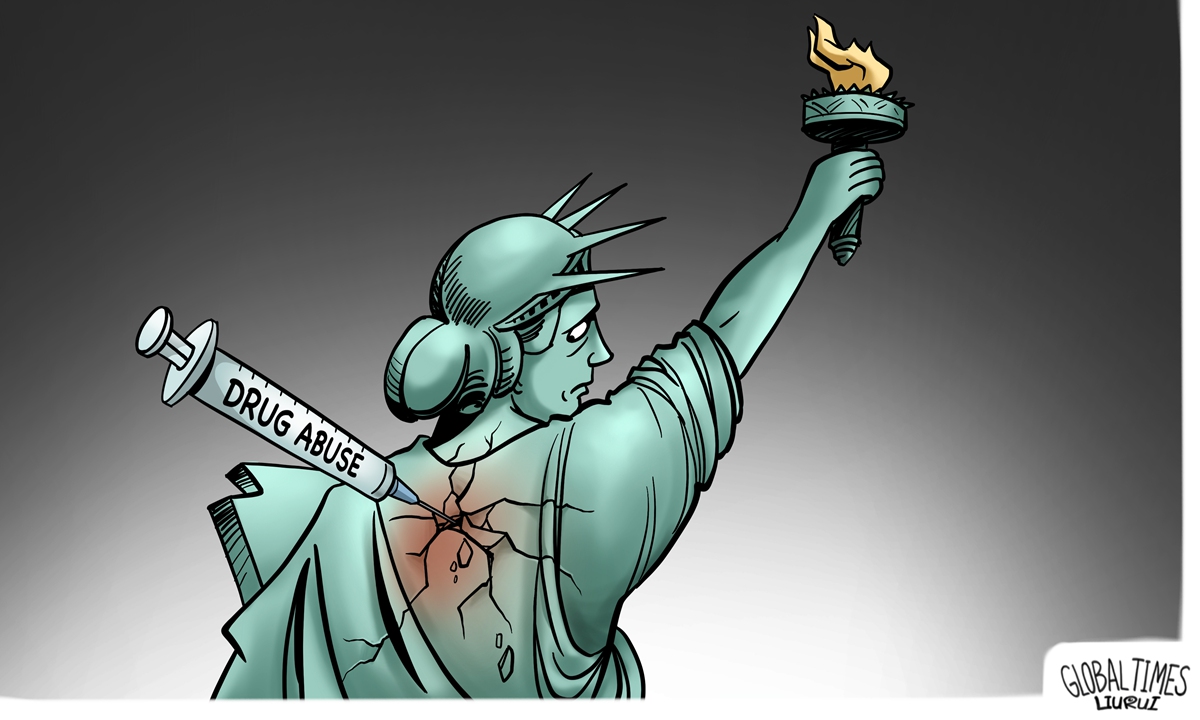
Illustration: Liu Rui/GT
"Do you know how cocaine got into the White House?" One reporter asked US President Joe Biden on Wednesday. However, Biden just sat there and smiled without giving an answer.
A white powder discovered in a small zipped bag at the White House on Sunday was proven to be cocaine, according to US media outlets. The incident has sparked extensive discussions across the US, as various sides attempt to speculate about who the drug belongs to. However, an official noted that it was pretty difficult to identify the culprit, given that the bag was found in a heavily frequented area of the West Wing of the White House.
"Even if there were surveillance cameras, unless you were waving it around, it may not have been caught," said the official. "It's a bit of a thoroughfare. People walk by there all the time."
Some individuals justified the incident as merely "a failure of security, most likely by the US Secret Service." But is it really that simple? While cocaine was found at the presidential palace of the world's most powerful country, a location known for its high level of security and extensive protection measures, US officials are unable to identify the responsible party and attribute it to the limitations of White House surveillance cameras. Isn't it ridiculous to rely on such a feeble excuse to navigate through this situation? Imagine if a bomb instead of cocaine had been discovered at the White House, would these officials also let it go so easily?
Even though White House press secretary Karine Jean-Pierre claimed that they have confidence that "the Secret Service will get to the bottom of this," we should not anticipate any actual result from the promised investigation, as the White House, the home to US President and First Family, has long been no stranger to drugs.
In 2020, former US president Jimmy Carter revealed that his son James Earl "Chip" Carter had smoked pot with musician Willie Nelson on the White House roof in 1980. Rapper Snoop Dogg also admitted smoking marijuana in a White House bathroom in December 2013.
Moreover, several US leaders, privately or publicly, have acknowledged their drug history. Former presidents, such as Bill Clinton, George W. Bush and Barack Obama, admitted to smoking marijuana when they were younger. Obama went even further, revealing that he had used cocaine in the past, making him the only US president to confess to doing so.
The presence of drugs in the White House serves as a perfect example of the inability of the US, as a drug-infested nation, to manage illegal substances effectively. Apart from showing a sense of embarrassment, Biden's mysterious smile probably also proved how resignedly Biden is in the face of the drug epidemic in the country. With illegal substances infiltrating the White House and US presidents setting an example as drug users, one wonders if the US can ever truly eradicate its drug crisis.
Amid the intensified bipartisan tensions in the US, the White House cocaine has naturally stirred up a heated debate between the two parties in the US' public opinion sphere. Yet, rather than delving into the underlying causes, the focus of the discussion tends to shift toward blaming the opposing side. When it comes to drug-related issues, some US politicians are inclined to scapegoat other countries, diverting domestic attention away from their own country's shortcomings in drug control by creating an artificial "external threat."
Lü Xiang, a research fellow at the Chinese Academy of Social Sciences, told the Global Times that the US, particularly the Democratic administration, indulges the usage of several psychiatric medications. And when it found that drugs had caused tens of thousands of deaths directly every year, it started to blame other countries, demonstrating an extremely irresponsible attitude.
"The Republicans, on the other hand, are always attacking the Democrats for poor governance of the drug problem. But it's all about shouting out empty slogans, since they don't actually care about the issue either," Lü noted.
The Democratic and Republican parties have been locked in a pathological confrontation, which certainly does not help the US' drug control. There is a very interesting phenomenon in the country's bipartisan competition: The Republicans indulge guns and, thus, violence, while the Democrats call for looser drug regulation, which means they indulge drugs. Both parties support society's dark sides, which is hard to imagine for any normal society, added Lü.
Zhang Wenzong, Deputy Director of the Institute of American Studies at China Institutes of Contemporary International Relations, said that the drug problem is, first and foremost, a US issue. "What the US needs to do urgently is to enhance its laws, law enforcement, policies at home and strive for cooperation from other countries, rather than threatening them."




